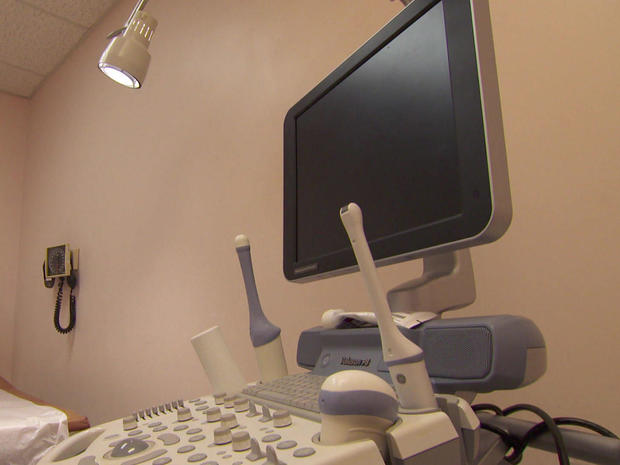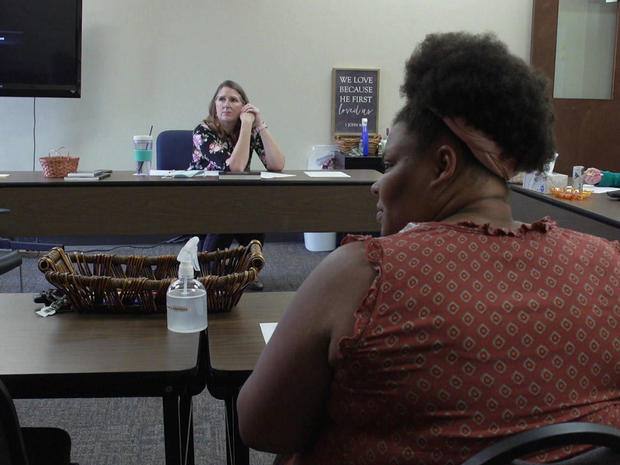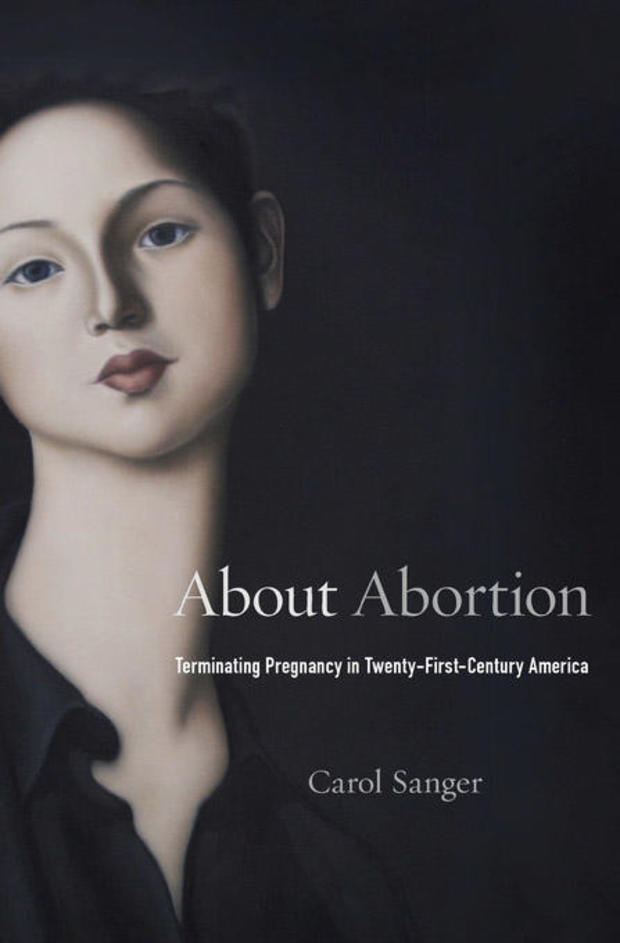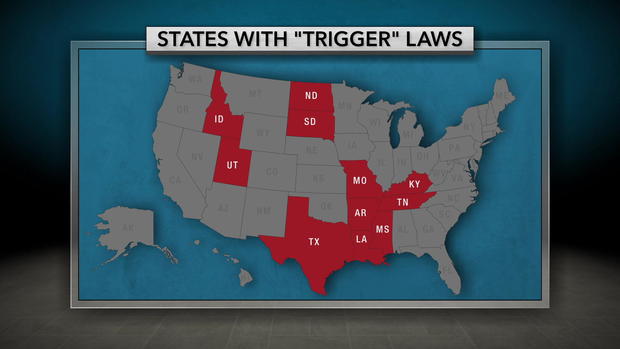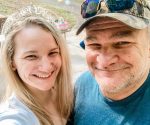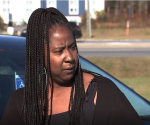Abortion: The great divide – CBS News
[ad_1]
EMW Women’s Surgical Center in Louisville is on the frontlines of the abortion conflict – one of just two clinics in Kentucky that provides abortions. Three-thousand women come here for those services each year, and every one of them must run a gauntlet of protesters. “This is not healthcare; this is killing human beings,” said one woman standing outside the entrance.
Dr. Ernest Marshall co-founded the clinic in 1980. He told correspondent Rita Braver that there’s a simple reason he offers women abortions: “You can never be equal if you can’t control your reproduction.”
But, Marshall says, over the years Kentucky (like many states) has greatly limited abortion and increased restrictions. For example, a woman who wants to end her pregnancy must undergo an ultrasound, with the doctor required to turn the volume up. “It’s crazy that we have to turn on the heartbeat and allow a patient to hear it, and tell her to cover her ears if she doesn’t want to hear it,” Marshall said. “It’s just very traumatizing to the patient.”
CBS News
Another Louisville women’s center is also on the frontlines: BsideU for Life, started by a group of local churches, which tries to the convince women not to have abortions.
“Our mission is to share the hope and support of the gospel of Jesus Christ to those who were affected by unplanned pregnancy,” said Monica Henderson, the center’s director. “A lot of women choose abortion because they feel like they don’t have a choice.”
April Hickman has been coming to BsideU for Life for counseling, prayer, and other support services since 2013. She said she arrived pregnant, jobless and desperate, fearing her only alternative might be an abortion.
Braver asked her, “What did you realize about yourself?”
“That I was capable,” Hickman replied. “Was it hard? yes, very hard. But, through them, I am a better mom.”
Hickman said BsideU helped her get baby supplies for her daughter, Marlee, now eight, as well as access to government daycare and housing programs. “I was still this broken person,” she said, “but having her just … it made me do better. She’s the most amazing, the most amazing people that I know.”
CBS News
Hickman now has a job, and two younger children. But the folks at EMW Women’s Surgical Center have also made a difference in the lives of women like Courtney Bennett, a mother of one who last year was thrilled to learn that she and her partner were expecting a second child.
Then, tests revealed severe anomalies in the fetus: “We knew that this was a confirmed diagnoses that we couldn’t change,” Bennett said. “There was also a high risk of not being able to carry full term.”
At 15 weeks, they reluctantly determined an abortion was the only option for them.
Braver asked, “What was it like for you to have to come to this decision, finally?”
“There’s no way around it; it was the hardest decision ever,” Bennett said.
Yet, she says she still remembers the shame that protesters tried to make her feel: “So, I understand that another individual would not necessarily make a decision to have an abortion. What I don’t understand is that, that individual would want to tell me that I don’t have the freedom or the right to make the best decision for me.”
For the half century since it was handed down, the ruling in the case of Roe v. Wade, that abortion is protected by the Constitution’s 14th Amendment right to privacy, has been the subject of demonstration and litigation.
“It is beyond divisive; it’s inflammatory,” said Columbia University Law School professor Carol Sanger, a noted expert on abortion law, and author of “About Abortion: Terminating Pregnancy in Twenty-First-Century America.”
Braver asked, “How common is abortion in America?”
“One in four women will have an abortion sometime in their life,” Sanger said.
Harvard University Press
She points out that most women who have abortions already have at least one child. But, Sanger said, the Supreme Court never authorized an absolute right to abortion.
What the decision in Roe v. Wade grants woman is “the right to decide to terminate a pregnancy prior to viability,” Sanger said. “It is not abortion on demand. And so, viability is simply – or not so simply – the ability of the fetus to live outside its mother’s womb.”
“There’s no one moment that has ever been established where this happens?” asked Braver.
“There’s no one moment in time.”
And many abortion rights opponents argue that life starts at the moment of conception.
Former Kentucky State Legislator Addia Wuchner is now executive director of Kentucky Right to Life. She has helped craft some of Kentucky’s most stringent abortion laws, including one that will come before the U.S. Supreme Court this week, on a procedural issue.
Braver asked her, “So, you just think that if a woman becomes pregnant, then she should have no choice but to bear the child?”
“We act like bearing a child is a punishment,” Wuchner replied.
“No, some women choose not to bear the child. The question here is, should a woman who doesn’t want to bear a child have to bear that child?”
“I believe that child has a right to life,” Wuchner said. “There’s not a hierarchy of rights, or dignity, or sanctity, between the mother and the child.”
“When you’re talking about the child here, you’re talking about the fetus?”
“Yes,” Wuchner said.
And now, many experts believe that the three justices appointed by former President Donald Trump may help form a Supreme Court majority ready to overrule Roe v. Wade. “They’re either getting ready to overturn it or to limit it,” said Sanger.
Here’s why: In December, the court will hear a Mississippi case that specifically argues that Roe should be overturned. Meanwhile, the justices refused to block a Texas law – now making its way through the lower courts – that allows any person to file a civil suit against anyone who helps provide most abortions.
And if the court does overrule Roe v. Wade, individual states will have complete power to make their own abortion laws.
“The legality of abortion is really at issue here; it’s at stake,” said Heather Gatnarek, an attorney with the American Civil Liberties Union of Kentucky. She said her state is one of 11 that have so called “trigger laws” on the books: “If the Supreme Court were to reverse Roe, Kentucky would immediately ban abortion in the state.”
CBS News
Braver asked, “Does it have an exception for the health of the mother, or rape or incest or something else?”
“No, this is a blanket, across-the-board ban on abortion,” Gatnarek replied. “No abortion in Kentucky.”
Addia Wuchner, of Kentucky Right to Life, said, “If you don’t want your child, we will find pathways for adoption. But we’re also making a choice for another life, and that’s the life of the child.”
But abortion rights advocates predict that while wealthy women will travel to states that allow legal abortion, poorer woman may resort to pre-1973 “back alley” solutions. Dr. Ernest Marshall, who said he will have to close his clinic if Roe v. Wade is overturned, fears the worst for some of the one in-four American women who choose abortion: “One of my best friend’s sister was pregnant and drank turpentine. And she was in high school, and it destroyed her liver and she died from that. So, these things will be revisited.”
Could there ever be a compromise on abortion in America? Professor Carol Sanger says it’s unlikely:
“If you think abortion is murder, there’s no compromise on that,” she said. “And if you think that the state doesn’t have the right to tell you to have another child, there’s no compromise on that for you.”
For more info:
Story produced by Sari Aviv. Editor: Mike Levine.
Download our Free App
For Breaking News & Analysis Download the Free CBS News app
[ad_2]
Source link






